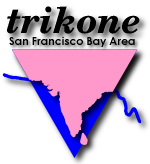
Trikone (Hindustani pronunciation: [t̪rɪˈkoːn]) is a non-profit support, social, and political organization for South Asian bisexual, lesbian, gay, and transgender people.[1][2][3] It was founded in 1986 in the San Francisco Bay Area and is one of the oldest groups of its kind in the world.[4][5][6] South Asians affiliated with Trikone are from or trace their ancestry to the following countries: Afghanistan, Bangladesh, Bhutan, India, Maldives, Burma, Nepal, Pakistan, Sri Lanka, and Tibet.[7] Trikone published an eponymous magazine with an international base of subscribers several times a year.[8] The magazine was the oldest South Asian LGBT magazine in the U.S., and ran from 1986 to 2014.[9][10]
Several metropolitan areas in North America aside from the San Francisco Bay Area also have organizations named "Trikone" (such as Trikone Northwest and Trikone Michigan), which have similar missions.[11]
History and activities
The organization was co-founded in 1986 by Arvind Kumar and Suvir Das[12] with the name "Trikon" and the first newsletter was published with that name in January 1986. (The name was later changed to "Trikone" due to a name conflict with an unrelated organization, "Tricon".) Following media coverage in both the United States and India, a group soon formed to continue the publication of the newsletter and to participate in local events such as the San Francisco Gay & Lesbian Pride Parade.[13][14]
In 2000 and 2006, DesiQ, a South Asian queer conference of international scope was produced by the organization.[15] In September 2001 QFilmistan, a film festival, was also produced.[16]
About the name
"Trikone" (Hindi/Marathi/Sanskrit: त्रिकोण, Telugu: త్రికోణ్, Urdu: تْرِكون, Gujarati: ત્રિકોણ, Punjabi: ਤ੍ਰਿਕੋਣ, Bengali: ত্রিকোণ, Malayalam: ത്രികോൺ) means "triangle"[17] in many South Asian languages. The pink triangle is a historical symbol employed in gay liberation movements.
Women of Trikone
Women of Trikone is a sub group and also has separate a list-serve for queer women of South Asian descent from the Bay Area.[18]
See also
References
- ^ Atkins, Dawn, ed. Looking queer: Body image and identity in lesbian, bisexual, gay and transgender communities. Psychology Press, 1998.
- ^ Leong, Russell, ed. Asian American sexualities: Dimensions of the gay and lesbian experience. Psychology Press, 1996.
- ^ Shah, Nayan. "9. Sexuality, Identity, and the Uses of History." Q and A: Queer in Asian America (1998): 141.
- ^ Vanita, Ruth. "Lesbian Studies and Activism in India." Journal of Lesbian Studies 11.3-4 (2007): 244-253.
- ^ "About Trikone". Retrieved 2008-02-02.
- ^ Ramakrishnan, L. "Putting the'B'Back in LGBT: Bisexuality, Queer Politics and HIV/AIDS Discourse." (2006).
- ^ Balachandran, Chandra S. "A preliminary report on emerging gay geographies in Bangalore." South Asia: Journal of South Asian Studies 24.s1 (2001): 103-118.
- ^ "Trikone magazines". Retrieved 2008-02-02.
- ^ Parasar, Anuradha. "Homosexuality In India–The Invisible Conflict."
- ^ "Desi-Queer Flashback 1986: Launching Trikone Magazine". Sholay Events. Retrieved 2020-12-10.
- ^ Jeung, Russell. "RELIGIOUS IDENTITY AND MARGINALIZATION." Encyclopedia of Asian American Issues Today 1 (2010): 457.
- ^ Amlani, Alzak (2011-07-07). "Being Indian in America". India Currents. Retrieved 2017-08-10.
- ^ "Minority Gays Create a Voice for Unserved Community". Retrieved 2008-02-04.
- ^
Kumar, Arvind (2008-02-11). (Interview). Interviewed by Arvind Kumar.
{{cite interview}}: Missing or empty|title=(help) - ^ "LGBT Pride Celebrations". Retrieved 2008-02-02.
- ^ "QFilmistan: The first South Asia LGBT film festival". Retrieved 2008-02-02.
- ^ Platts, John (1884). A dictionary of Urdu, classical Hindi, and English. London: W. H. Allen & Co. p. 319. ISBN 81-215-0098-2.
- ^ Women-of-Trikone Archived 2008-03-26 at archive.today
